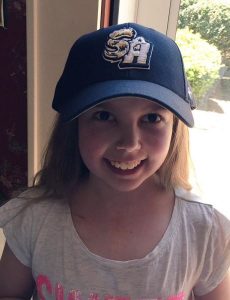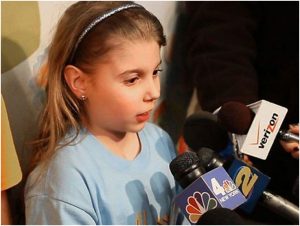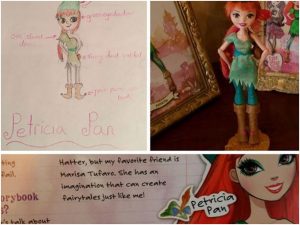 A picture of my beautiful daughter, Marisa Rose Tufaro, affixed with medical tape to the wall above her hospital bed, starkly contrasted the child lying below.
A picture of my beautiful daughter, Marisa Rose Tufaro, affixed with medical tape to the wall above her hospital bed, starkly contrasted the child lying below.
Marisa’s gorgeous brown eyes — brighter than stars and the most distinguishing characteristic of her angelic face — were now hidden behind gently closed lids and stunningly long lashes as she peacefully drifted from this world to her rightful place in heaven.
The photograph of Marisa, smiling naturally under a navy blue baseball cap bearing the logo of the San Antonio Missions, a minor league team we watched play during a favorite family vacation, captures her quintessence and is the way she should forever be remembered.
A heart transplant, which was supposed to extend Marisa’s life, tragically cut it short after a postoperative complication developed into a rare form of Stage IV cancer to which she succumbed following a valiant battle.
Born with a complex cardiac defect, Marisa, who survived six open-heart surgeries and life-threatening comorbidities prior to transplant, died on January 30, 2017 at the age of 13, nearly seven months after receiving an organ donor’s ineffable gift.
 Marisa spent 161 of her last 214 days as a patient at Morgan Stanley Children’s Hospital in New York City, where dozens of doctors and nurses, profoundly impacted by her remarkable courage and indomitable spirit, were reduced to tears after chemotherapy and radiation treatments failed to thwart the relentless onslaught of an aggressive disease that riddled her brain and body.
Marisa spent 161 of her last 214 days as a patient at Morgan Stanley Children’s Hospital in New York City, where dozens of doctors and nurses, profoundly impacted by her remarkable courage and indomitable spirit, were reduced to tears after chemotherapy and radiation treatments failed to thwart the relentless onslaught of an aggressive disease that riddled her brain and body.
The compassionate medical team, which became our second family, worked relentlessly around the clock for Marisa, whose strength was boundless and who approached life, despite all of her health issues, with unjaded innocence and a positive outlook.
For a child who kept hundreds of doctor’s appointments and was hospitalized more than two years in total (my wife, Cyndi, and I were always at her bedside), Marisa lived a vibrant life that inspired.
She was intelligent, articulate, funny, charismatic (when feeling well), obstinate, sympathetic, feisty, determined, creative beyond words and, most importantly, loved.
Marisa was an honor roll student at Edison’s James Monroe Elementary School and Herbert Hoover Middle School — a credit to outstanding educators whose role in Marisa’s complete development can never be overstated — until illness relegated her as a seventh-grader to home instruction.
She served as student council vice president at James Monroe, where Marisa also participated in annual spring musicals, wrote for the school newspaper, sang in the school chorus, played percussion in the school orchestra and was a member of various clubs. She spoke on camera to a media contingent — including reporters from WCBS-TV and WNBC-TV in New York — when James Monroe students relocated to Middlesex County College in Edison after a fire destroyed their school.
Marisa served on the Youth Advisory Council at Children’s Hospital of Philadelphia, took classes at European School of Dance in Fords, attended summer camps at Middlesex County College, received vocal lessons at School of Rock in East Brunswick, developed a love for horses at Special Strides Therapeutic Riding Center in Monroe and performed in two musicals — “Dear Edwina” (Abigail) and “The Wizard of Oz” (chorus) — at the Forum Theatre in Metuchen. As part of national Take Our Daughters and Sons to Work Day, she conducted an extensive video interview with former St. Joseph High School basketball star Karl-Anthony Towns, the No. 1 overall pick of the 2015 NBA Draft.
An exceptional artist who excelled at drawing, Marisa took summer classes at Rutgers University’s Zimmerli Art Museum, where her work was once showcased in a gallery. Marisa’s ambition was to attend an arts college, and while God’s plan won’t allow her to make it to one, her work will. A piece Marisa constructed with a New York City School of Visual Arts graduate student during an art therapy session in the hospital will be displayed at the “Your Turn” exhibit at the college’s Flatiron Gallery in Manhattan next month.
Marisa’s hobbies included crafting. Her ability to create with virtually any object — especially duct tape and boxes — would challenge MacGyver’s resourcefulness. She developed an interest in designing dolls, which Make-A-Wish helped become a reality.
 Long before Make-A-Wish’s involvement, Marisa emailed to Mattel a letter and drawing of a doll she designed, named Petricia Pan, in the spirit of the toy company’s Ever After High collection. In her correspondence, Marisa wrote in part: “When I grow up I want to design doll outfits as my dream job. I truly hope you can take this doll into consideration and that you can make her a reality. It would mean the world to me to have my idols make a character for me that I created.” Upon the request of Make-A-Wish, Mattel brought a prototype of the doll to life with every detail meeting Marisa’s specifications. Volunteers from Make-A-Wish delivered the doll to Marisa in specially designed packaging with an accompanying letter and artist renderings. Make-A-Wish arranged for Marisa to fly to Mattel’s headquarters in California to meet and collaborate with the design team, but the trip sadly never took place due to her illness.
Long before Make-A-Wish’s involvement, Marisa emailed to Mattel a letter and drawing of a doll she designed, named Petricia Pan, in the spirit of the toy company’s Ever After High collection. In her correspondence, Marisa wrote in part: “When I grow up I want to design doll outfits as my dream job. I truly hope you can take this doll into consideration and that you can make her a reality. It would mean the world to me to have my idols make a character for me that I created.” Upon the request of Make-A-Wish, Mattel brought a prototype of the doll to life with every detail meeting Marisa’s specifications. Volunteers from Make-A-Wish delivered the doll to Marisa in specially designed packaging with an accompanying letter and artist renderings. Make-A-Wish arranged for Marisa to fly to Mattel’s headquarters in California to meet and collaborate with the design team, but the trip sadly never took place due to her illness.
As her condition precipitously declined, Marisa’s medical team went out of its way to ensure our daughter was comfortable. She was treated with the utmost dignity and respect. Nurses took remarkable steps to make her feel at home.
Upon learning our family’s Christmas Eve tradition was to take Marisa to Build-A-Bear, nurses brought that experience to her bedside with two huge bags of white stuffing, a cute brown bear, a hospital scrubs outfit and a red heart to place inside the stuffed animal before it was stitched closed.
On Christmas morning, New York Rangers goaltender Henrik Lundqvist, a father of two who was beyond generous with his time, visited Marisa and several other patients on the floor. Marisa, who was still able to communicate, told Lundqvist about playing floor hockey in gym class at James Monroe. She encouraged Lundqvist to play hockey in the house — as she and I did using sticks and nets — with his own young daughters.
 The day before Marisa was placed on a ventilator, nurses arranged, with the approval of a hospital administrator, for our family dog, a beagle named Dunkin, to visit the room. Dunkin rested at the foot of Marisa’s bed.
The day before Marisa was placed on a ventilator, nurses arranged, with the approval of a hospital administrator, for our family dog, a beagle named Dunkin, to visit the room. Dunkin rested at the foot of Marisa’s bed.
After doctors informed us they had exhausted all medical options, a nurse presented our family with a pillow she handcrafted. The white casing contained the names of the entire Pediatric Cardiac Intensive Care Unit staff and artwork of footprints with the words: “When you see only one set of footprints in the sand it was then that I carried you. God bless Marisa.”
Members of the medical team subsequently came to the bedside in small groups or as individuals to offer their condolences, affording Cyndi and I an opportunity to reminisce about Marisa, a cathartic experience that filled the room with laughter and tears.
Marisa loved Broadway shows (she met Adam Jacobs, the original Aladdin, backstage), going to the boardwalk, spending time at the arcade, playing video games, going to the movies, listening to music (she had eclectic taste), collecting stuffed animals, trips to the zoo, dining out, watching cartoons, birds, taking vacations (Disney World, Cape May and Delaware were her favorite destinations) and, most of all, being with family.
I enjoyed a wonderfully imperfect relationship with my daughter — hitting plastic baseballs in the field behind our house and playing board games and poker were among our favorite pastimes — but Marisa was far from a “Daddy’s Girl.” Sometimes I wondered if the obstetrician ever severed the umbilical cord. Unlike most kids, who greet a new day with the phrase “good morning,” the first two words out of my daughter’s mouth were literally quite often “where’s mom?” I remain envious — not jealous — of the uniquely special bond Marisa enjoyed with my amazing wife. Cyndi was Marisa’s best friend. She could not have been a better and more patient mother. Caring at home for a child with special needs, Cyndi spent many sleepless nights tending to Marisa and somehow managed to return to work the following morning as her pleasant self.
Our juxtaposed parenting styles — Cyndi and I worked opposite schedules so that we could care for Marisa — complemented one another. Marisa often called me Marlin, a reference to the neurotically overprotective father from “Finding Nemo,” her favorite movie (Marisa identified with Nemo because he, too, overcame challenges). Cyndi embraced a more flexible approach, which allowed our family to maintain a semblance of normalcy while overcoming mounting medical issues. She brought Marisa places — to see “Swan Lake” at Lincoln Center and to watch a Selena Gomez concert at the Prudential Center — which I would have been inclined to refrain from taking our daughter out of concern for her stamina. I am grateful Cyndi encouraged us as a family to not live a sheltered life, because doing so provided Marisa with a wealth of experiences.
Growing up in the same Edison neighborhood as her maternal relatives enabled Marisa to share precious time with her grandmother, aunt and older cousins. “Mimi,” who treated Marisa like her own child, exercised a matriarchal right to spoil her granddaughter with shopping sprees and luncheons. Aunt Sue, Marisa’s second mother, found a new baking partner in her beloved niece. Sue’s kids filled the house with laughter whenever they played with Marisa, who they loved like a sibling. Visits from Uncle Joe and Aunt Lorraine, who showered Marisa with presents, often involved a LEGO creation. “Nana” always looked forward to seeing her “precious little angel,” for who she incessantly prayed. Marisa anticipated visiting her relatives in Spain, who adored her from afar, one day.
God blessed us with Marisa, whose perseverance and spirit had a life-changing impact on many, for 13 wonderful years. Even in her untimely passing, Marisa still has the ability to teach life lessons.
As a journalist who toiled inordinate hours — acting on many occasions like a doctor on call, albeit far less important, to handle breaking news — and as a father who invested significant time taking meticulous care of the house, I will forever live with one heartbreaking regret: I did not get to spend enough quality moments with my beautiful daughter because I struggled, like all parents, to find a healthy balance between work and family.
I implore parents of school-age children, or any-age children for that matter, to do something special on an ordinary day with their kids.
Make a memory, in honor of Marisa, which you can cherish forever.

